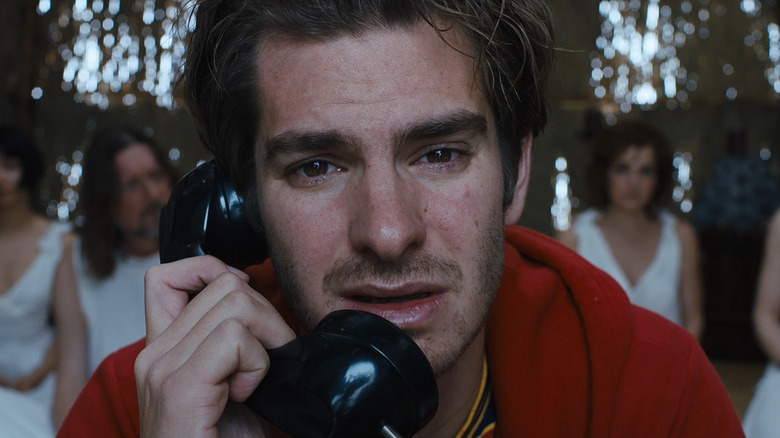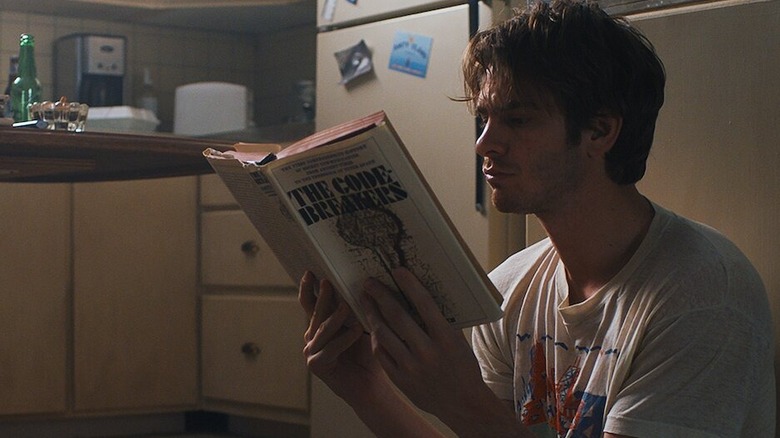The Ending Of Under The Silver Lake Explained
Since its debut at Cannes in 2018 (via Deadline), "Under the Silver Lake" has divided audiences into two camps: those who see meaning in every decision made by writer-director David Robert Mitchell and those who, well, don't. But whatever your opinion is about how successfully this neo-noir dark comedy delivers its ultimate meaning (if, indeed, it even has one singular point to make), it's safe to say that the film — both thematically and in its painstaking attention to detail — delivers quite a bit for fans and critics to digest.
"Under the Silver Lake," with its lethargic lead, surrealist scenes, eccentric characters and wardrobe, downright labyrinthian plot, and intentionally stifling depiction of the general malaise, sexism, and superficiality of 2011 L.A., feels a bit like what would happen if David Lynch and Federico Fellini were tasked with creating a performance art piece based on T.S. Eliot's "The Wasteland." Or, as Reddit user u/Feline_good420 more succinctly put it — there's "lots to unpack here."
Let's begin then, shall we?
Down the Rabbit hole
First, a brief refresher on how David Robert Mitchell kicks off his perplexing promenade into the abyss: "Under the Silver Lake" begins by introducing viewers to its Kurt Cobain-worshipping, shower-ignoring, and foul-smelling lead, Sam (depicted with unnerving ease by Andrew Garfield). On a day we're meant to believe is much like every other in this deadbeat protagonist's life, Sam happens to meet and share a kiss with his neighbor and very own manic pixie L.A. dream girl, Sarah (Riley Keough).
Unfortunately, just as things begin heating up between them, her two roommates return (with a mysterious hipster pirate in tow) and she cuts their evening short by telling him to come back and see her the following day. However, when Sam returns to her apartment, Sarah's nowhere to be found and neither are her roommates. It seems like they all just up and stole away (or were stolen away) in the middle of the night, leaving behind nothing but a bit of baffling graffiti and a shoebox of curious belongings, which Sam later witnesses another beautiful trio of L.A. women remove from the empty apartment.
From there, Sam's quest to track down his fantasy woman, which takes him down a rabbit hole littered with red and not-so-red herrings, dead dogs, ominous encounters, underground tunnels, and messages hidden in indie-pop songs and on the backs of cereal boxes, begins in full. At the end of his adventure, Sam is left both vindicated (it turns out his obsession with secret messages and codes was justified) and heartbroken (he doesn't get the girl, because the girl is in an underground tomb bunker with a middle-aged billionaire and the rest of his death cult of women).
There's nothing to solve, you know?
In endeavoring to derive an all-encompassing thesis from Mitchell's strangely deliberate yet meandering film, it's tempting to fall for the very bait Sam does. But trying to "decode" Mitchell's intentionally heavy-handed use of barely hidden pop-cultural and literary references (e.g. Sam's quest begins with him following a group of women around in an actual white rabbit convertible) doesn't reveal the film's meaning so much as reinforce it.
Oddly enough, Mitchell repeatedly tells viewers exactly what he's saying in "Under the Silver Lake." The problem is that by the time he does, we don't notice it because we're already too focused on trying to figure out if Sam is paranoid, delusional, or actually right for thinking that, as he himself says, "Maybe there are people out there who are more important than us, more powerful, communicating things in the world that are meant for only them and not for us." In forcing the viewer to watch the film through the perspective of the obsessive and (possibly) delusional Sam, the "It Follows" director makes viewers part of his greater psychological experiment.
Will the viewer listen to Sam's "Bar Buddy" (Topher Grace), who all but beats him over the head with the film's central theme when he casually notes that, "We crave mystery 'cause there's none left," or will we be seduced by the promise of a greater mystery? In other words, will we also be pulled in by all the many Reddit-ready red herrings and references that Mitchell deliberately places throughout his otherwise straightforward lament of a movie?
Getting to the bottom of things
On the one hand, it should be easy to see Mitchell's magic trick for what it is. Grace's "Bar Buddy" isn't even the only character who explicitly lifts the proverbial curtain. One night over drinks, a struggling actress and performance artist credited as "Balloon Girl" (Grace Van Patten) also tells Sam, "There's nothing to solve, you know? It's silly, wasting your energy on something that doesn't matter." On the other hand, this isn't the answer Sam's looking for, and after having invested so much into his quest already, it isn't the one viewers are looking for either.
This refusal to see what's really there in a desperate effort to prove "what's really really there" comes to a head when Sam meets "The Songwriter" (Jeremy Bobb). A grotesque, crypt keeper-like incarnation of the machine of capitalism, The Songwriter is someone who, as Bright Wall/Dark Room writer Ethan Warren points out, acts "as a fever dream avatar of all the contemptuous greed that powers the global entertainment complex" and "makes literal all of Sam's amorphous anxieties." As a character, The Songwriter makes clear to both Sam and the viewer that there's nothing to be gained but disappointment and disillusion from continuing to attempt to get to the bottom of things. "Your art, your writing, your culture," he says, "is the shell of other men's ambitions."
Be careful what you search for
Both Sam and the viewers watching "Under the Silver Lake" are told, over and over again, that there's simply "nothing to see here." However, at the same time, we're also being fed irresistible bread crumbs that suggest there very much is something to see. In fact, when Sam eventually locates Sarah, the various conspiracies he so easily convinces himself are real actually turn out to be. What's not real — to Sam's dismay, but perhaps the audience's relief — is the story he told himself about a damsel in distress lying in wait for him to rescue her. Sarah doesn't want his help because, as she reminds both him and the audience, "... You hardly know me." The hidden conspiracy Sam "uncovers" ultimately tracks, but the meaning he creates, believes in, and is motivated by, does not.
This, perhaps, is the film's biggest twist. In vindicating his protagonist's paranoias but destroying the last few shreds of dignity required to drive such conviction, Mitchell brings us to a horrifyingly bleak conclusion: the real danger in searching for meaning in all the wrong things (fame, wealth, becoming, as Sam says, "someone who mattered") isn't that we won't find it — but that we will. "Under the Silver Lake" suggests that although, as Socrates said, the "unexamined life" may not be "worth living," the over-examined life might also expose you to the truths that kill you.
From anti-heroes to superheroes
Whether you're a die-hard fan of David Robert Mitchell's disturbingly inverted noir homage or find more than a few of his attempts at commentary, like his repeated calling-out of the misogyny that powers Hollywood, paradoxically unsuccessful, "Under the Silver Lake" is undeniably a film that stays with you. It confirms that Mitchell is one of the most unique filmmakers working today, which just makes the subject and genre of his next project all the more interesting to consider.
The filmmaker's next movie, currently titled "Heroes & Villains" (via Variety), will mark his foray into the almighty superhero genre. While that may seem, at first glance, like a far cry from the societal investigation and indictment that is "Under the Silver Lake," it's possible that Mitchell is planning to bring something very new to the superhero world. As IndieWire reporter Tyler Hersko points out, "If anyone could breathe fresh air into the field [of superheroes], it just might be Mitchell." After all, if you squint hard enough, Sam in "Under the Silver Lake" does seem reminiscent of a kind of pre-Disney+ Loki (Tom Hiddleston), at least insofar as he clearly believes himself to be "burdened with glorious purpose" — despite all the evidence to the contrary.





